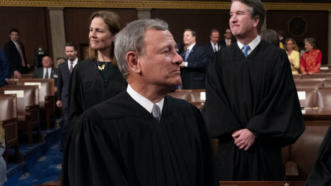Civil Procedure
Google Missed Key Deadline in Suit Alleging Google's AI Libeled Business, Court Holds
A federal district court rules that the case should go back to Minnesota state court, rather than being in federal court.
Lawyer Hijinks in Laura Loomer's and Bill Maher's Depositions
The magistrate judge is not amused.
Court Rejects Subpoena Request from Turkey Seeking Records on Gülen Movement Member, Allegedly for Turkish Financial Crime Prosecution
"[T]he sheer breadth of the discovery sought in Türkiye's Application, considered in light of the colorable allegations of political motivation presented in support of Turkyolu's motion, weighs heavily against the Application at this time."
Abortion, Colorado River, and Interpleader
The true superpower of the lawyer is to turn all questions into questions about procedure—often, about procedure about procedure.
Interesting Rule 11 / Incorrect Allegation Question in One of the Sean Combs Civil Cases
Can plaintiffs be sanctioned because they "refused to voluntarily dismiss [a defendant] after reviewing the additional information from his cell phone and bank records" that seems to exonerate him?
Anti-DEI Executive Orders Can Go Forward, for Now, Says Federal Appeals Court
A district judge had "found the provisions likely unconstitutional and issued a nationwide injunction" against them; the Fourth Circuit just stayed that injunction, pending full consideration of the issue on appeal.
Court Decision About Discovery in Libel Lawsuit Against Council on American-Islamic Relations Foundation
CAIR's allegedly libelous press release about a dismissed former high-level employee "opened the door" to discovery about various allegations the employee had made about CAIR.
Why Suing LLCs in Federal Court Under Diversity Jurisdiction Can Be So Complicated
Seems hard to justify, especially since corporations are treated quite differently; but there it is.
Fifth Circuit Stays Broad Discovery Regarding Media Matters Donors in X v. Media Matters
The court concludes that X's requested discovery is broader than necessary, though it leaves open the door to some considerably narrower discovery.
New Bill Would Revive the Right To Sue Federal Cops for Constitutional Violations
The Supreme Court created, then gutted, a right to sue federal agents for civil rights violations.
SCOTUS Rules SEC's In-House Handling of Securities Fraud Cases Violates the Right to Trial by Jury
The decision rejects a system in which the agency imposes civil penalties after investigating people and validating its own allegations.
"Large Libel Model" Lawsuit Against OpenAI Headed Back to Georgia Court
OpenAI tried to remove Mark Walters' lawsuit to federal court, but has now withdrawn that attempt.
#TheyLied Plaintiff Suing for Defamation Over Sexual Misconduct Accusations Can't Use Subpoena to Unmask Pro-Defendant GoFundMe Organizers
"The subpoena is ... a classic ‘fishing expedition’ in constitutionally protected waters.”
Discovery of Comparator Incidents Available in Title IX Wrongful-Discipline Cases
A good illustration of how this principle can work.
Massive Sanctions Against Rudy Giuliani for "Willful Shirking of His Discovery Obligations" in Libel Lawsuit Against Him
Among other things, "Default judgment will be entered against Giuliani as a discovery sanction ..., holding him civilly liable on plaintiffs' defamation, intentional infliction of emotional distress, civil conspiracy, and punitive damage claims ...."
The Lower Court "Found that [Defense Lawyer's] Comments Played on Stereotypes About the 'Angry Black Woman'"
"and the 'victimhood' of white women." "In support of its decision, the court ... pointed to defense counsel's description of Henderson as 'quite combative' on the witness stand and her description of Thompson as 'intimidated and emotional about the process.'"
Court Erred in Dismissing Challenge to L.A. City Employee COVID Vaccine Mandate
So the California Court of Appeal has held, concluding that there is enough of a factual dispute (under California's plaintiff-friendly pleading standards) for the case to go forward.
No Jurisdiction in Federal Court Over Saudi Activist's Claims Against Alleged Hackers for UAE Government
"Plaintiff's allegations of political retaliation and torture are highly concerning. Nevertheless, this Court is bound by jurisdictional limits and grants Defendants' Motion to Dismiss for lack of personal jurisdiction."
A Statute of Limitations Cautionary Tale, Here with Regard to Changing COVID-Related Tolling Rules
Take the No-Procrastination Pledge.



